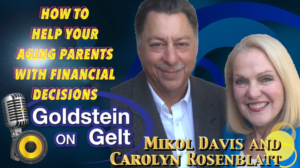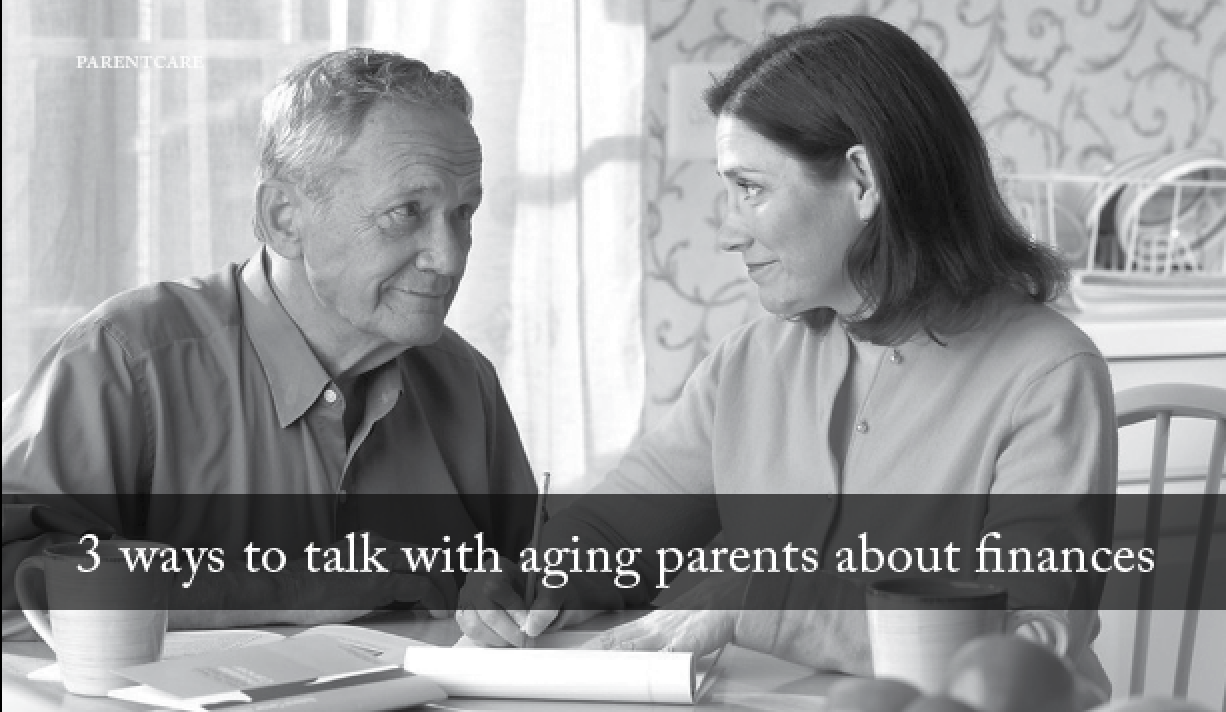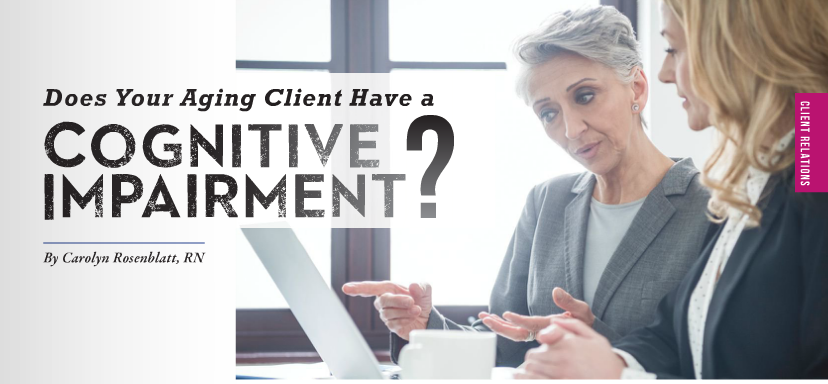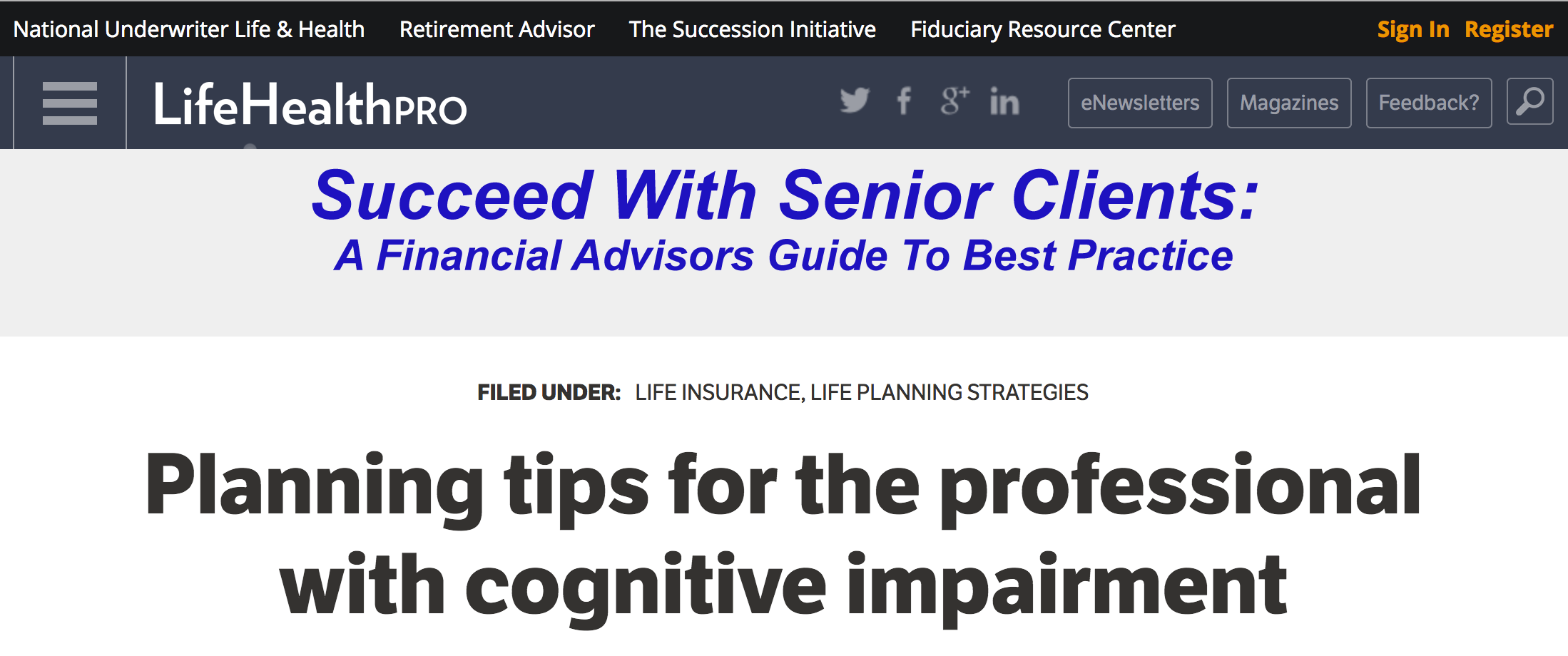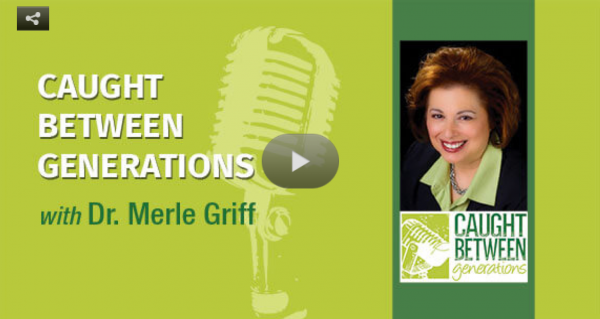In The News
Does Your Aging Client Have Diminished Capacity?
New article just published in the Society of Certified Senior Advisors Journal.
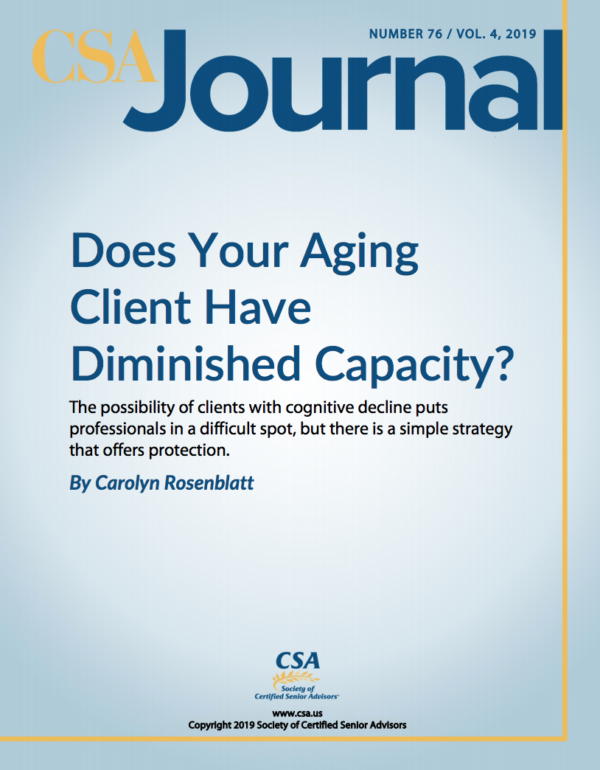

Carolyn appeared on The John Hancock Advanced Markets Radio show. Check out the recording below:
https://www.jhadvancedmarkets.com/calc/JHAMRadio/mp3/Carolyn_Rosenblatt_Aging_Clients_JHAM_FC.mp3
 As Benjamin Franklin once famously quipped, “In this world nothing can be said to be certain, except death and taxes.” That’s true. Unfortunately, the estate tax — more commonly known as the death tax — hits families as the worst possible moment. The controversial tax — one more chance for the IRS to fill its coffers from hard-working Americans — generates the kind of emotional fervor most financial issues do not deserve. Yet for all the willingness to talk about their dislike of the death tax, most people eschew discussion about other family financial matters, especially as parents get older.
As Benjamin Franklin once famously quipped, “In this world nothing can be said to be certain, except death and taxes.” That’s true. Unfortunately, the estate tax — more commonly known as the death tax — hits families as the worst possible moment. The controversial tax — one more chance for the IRS to fill its coffers from hard-working Americans — generates the kind of emotional fervor most financial issues do not deserve. Yet for all the willingness to talk about their dislike of the death tax, most people eschew discussion about other family financial matters, especially as parents get older.
 Amazing longevity as exists today is something of a new problem for those practicing law, particularly in estate planning. Law schools teach wills, trusts, and estates. They cover client confidentiality and loyalty. But no one teaches attorneys about the minefield of advanced age, the growing incidence of Alzheimer’s disease and other dementias. People are living longer than ever before in history, and this has created a problem for estate planners that is referred to as “the gray zone.” This is the period between a client’s complete capacity for all decisions and complete incapacity, particularly for financial decisions.
Amazing longevity as exists today is something of a new problem for those practicing law, particularly in estate planning. Law schools teach wills, trusts, and estates. They cover client confidentiality and loyalty. But no one teaches attorneys about the minefield of advanced age, the growing incidence of Alzheimer’s disease and other dementias. People are living longer than ever before in history, and this has created a problem for estate planners that is referred to as “the gray zone.” This is the period between a client’s complete capacity for all decisions and complete incapacity, particularly for financial decisions.

One benefit of the increasing life expectancies for Americans is that more people have bonus years for enjoying the company of their aging parents. However, not all is rosy. Those extended years also boost the odds that parents could go broke or suffer from dementia and be unable to make financial decisions for themselves. “That can leave adult children perplexed about when and whether they should step in and find out what’s happening with their parents’ money,” said Carolyn Rosenblatt, a registered nurse and elder law attorney.
 Our financial decision-making abilities peak in our 50s and can decline pretty rapidly after age 70, researchers tell us. That’s how otherwise smart older people fall for sweepstakes frauds, Nigerian investment schemes and the grandparent scam, where con artists pretend to be grandchildren in a financial jam. But few people want to hear that they’re not as sharp as they used to be. Many won’t recognize the rising risk of losing hard-earned life savings as they age, says financial literacy expert Lewis Mandell, author of “What to Do When I Get Stupid: A Radically Safe Approach to a Difficult Financial Era.”
Our financial decision-making abilities peak in our 50s and can decline pretty rapidly after age 70, researchers tell us. That’s how otherwise smart older people fall for sweepstakes frauds, Nigerian investment schemes and the grandparent scam, where con artists pretend to be grandchildren in a financial jam. But few people want to hear that they’re not as sharp as they used to be. Many won’t recognize the rising risk of losing hard-earned life savings as they age, says financial literacy expert Lewis Mandell, author of “What to Do When I Get Stupid: A Radically Safe Approach to a Difficult Financial Era.”
 CPAs have a unique vantage point with aging clients: you see where the money is going in detail. You may have known your client for many years and you can retrieve their spending records over time. You know patterns. You give advice and you help them figure out the tax picture. But more than that, you know your client. What’s the big deal, you may ask? Here’s the issue. We have a massive and growing problem of financial elder abuse in our country (and incidentally around the world) and you, the CPA, may be first to spot the warning signs.The wise CPA will know right away, at least at tax preparation time, that something out of the ordinary has occurred. Even if a client is not experiencing an unusual cash drain, you may see red flags that your client is declining in his/her cognitive abilities.
CPAs have a unique vantage point with aging clients: you see where the money is going in detail. You may have known your client for many years and you can retrieve their spending records over time. You know patterns. You give advice and you help them figure out the tax picture. But more than that, you know your client. What’s the big deal, you may ask? Here’s the issue. We have a massive and growing problem of financial elder abuse in our country (and incidentally around the world) and you, the CPA, may be first to spot the warning signs.The wise CPA will know right away, at least at tax preparation time, that something out of the ordinary has occurred. Even if a client is not experiencing an unusual cash drain, you may see red flags that your client is declining in his/her cognitive abilities.
 The financial services industry frequently shows concern about the problems of longevity and aging clients. Cognitive impairment, diminished capacity and dementia get air time with various solutions, mostly vague, offered by industry insiders. But one problem is not being addressed: the professional herself with cognitive impairment. It’s time to look at this as a real risk, not some unlikely possibility that can easily be taken care of by a succession plan for the professional’s business. Dementia is a complicated disease. READ MORE
The financial services industry frequently shows concern about the problems of longevity and aging clients. Cognitive impairment, diminished capacity and dementia get air time with various solutions, mostly vague, offered by industry insiders. But one problem is not being addressed: the professional herself with cognitive impairment. It’s time to look at this as a real risk, not some unlikely possibility that can easily be taken care of by a succession plan for the professional’s business. Dementia is a complicated disease. READ MORE
Talking with aging parents about finances
One benefit of the increasing life expectancies for Americans is that more people have bonus years for enjoying the company of their aging parents.
But all is not rosy. Those extended years also boost the odds that parents could go broke or suffer from dementia and be unable to make financial decisions for themselves.
That could leave adult children perplexed about when and whether they should step in and find out what’s happening with their parents’ money, said Carolyn Rosenblatt, a registered nurse and elder law attorney.
“Unfortunately, it’s not always easy to have those conversations,” said Rosenblatt, co-author with her husband, Dr. Mikol Davis, of The Family Guide to Aging Parents and Succeed With Senior Clients: A Financial Advisors Guide To Best Practices.
The Real Life Effect of Dumping Obamacare
The incoming administration is determined to “repeal and replace” the Affordable Care Act, known as Obamacare. Always devoid of detail on what replacement would look like, the proposal remains murky. Picks by the incoming president for those who would provide him with advice and therefore exercise control over any imagined replacement have shown their hands before now. Here’s what you may expect and here’s who will be most affected.
Carolyn Rosenblatt, an RN, Elder Law Attorney, and founder of AgingParents.com, discusses the future of the Affordable Care Act, known as Obamacare.
 Carolyn Rosenblatt on the Growing Problem of Elder Abuse
Carolyn Rosenblatt on the Growing Problem of Elder Abuse
Billions of dollars are stolen every year from senior citizens, which makes elder abuse, particularly through financial exploitation, a problem that needs to be taken seriously. Carolyn Rosenblatt, an RN, Elder Law Attorney, and founder of AgingParents.com, discusses this growing epidemic and the importance of certain checks and balances to help prevent such abuse from taking place.
By Carolyn Rosenblatt, RN, Attorney | AgingInvestor.com
Most of us know that financial abuse of elders is a problem. Maybe you’ve witnessed it among your clients or your own family or friends. But just how big a problem is it? Big. Billions of dollars big.
A recent study by TrueLink Financial puts the amount stolen from seniors in the United States at more than $36 billion each year. Thefts occur in many forms, from sneaky magazine offers that lead to recurring billing that the senior doesn’t know how to stop, to clever scammers who engage in telephone trickery to get them to write checks or wire money. For rip-off artists, preying on older Americans is easy work. Some elders come from a more trusting time and are easily misled. Others suffer from cognitive decline. Their judgment is gone and they don’t see the danger that might be more obvious to the unimpaired, so they are sitting ducks for any scammer.
The sad news is that the most frequent abusers of seniors are the people in their lives they trust the most: their own family members.
What’s Right With The Proposed Finra Rule Financial professionals are in a unique position to know their clients. They may have relationships that stretch over years, allowing the advisors and brokers to understand the client as well as seeing changes related to aging, particularly cognitive decline and diminished capacity. The potential discomfort of reporting is far outweighed by the benefits of reporting. Reporting to APS does not automatically solve every case of financial abuse of elders. It is at least a start to the process of investigation to find out if an aging person is being victimized. It will not stop a willing victim who is competent from giving away money to a relative who wants to take advantage of them. It can stop a thief who is preying on an incompetent person. That is what is most important. Furthermore, reporting can be done anonymously.
What’s Wrong With The Rule?
Hiding Alzheimer’s, like Gene Wilder did, is natural, so prepare for it with all clients
Because cognitive impairment is likely for most people as they age, advisers shouldn’t wait for signs to start planning
Funny man Gene Wilder, who died Monday at age 83 from complications due to Alzheimer’s disease, kept his illness hidden from most people for at least three years. That’s a common approach, experts said.
The star of Blazing Saddles, Willy Wonka and the Chocolate Factory, The Producers, and many other notable comedies, reportedly wanted his fans to keep laughing over his life’s work instead of feeling down about his failing condition.
Most Alzheimer’s sufferers hide symptoms for as long as possible out of fear they’ll lose control of their own lives if their family or friends think they can no longer take care of the things they’ve always handled, said Carolyn Rosenblatt, a registered nurse and elder law attorney. Patients who have advanced education or who have used their brains the most during their careers can usually hide the disease the longest, she said.
read more click HERE

“A Good Life Make Better,” The Good Life Made Better – Are Your Parents All There? Red Flags Of Cognitive Failure –
July 30, 2016
Radio interview with Authors Carolyn Rosenblatt and Dr. Mikol Davis.
Host Financial Advisor: Stephen Lovell

Don’t Invest and Forget
KRON TV
Carolyn Rosenblatt, R.N., Elder Law Attorney
Hosted by Pat Vitucci
Caring for an Aging Parent
How to prepare and be financially aware
Is anybody listening? When your parents refuse to listen and your adult children don’t want to listen
June 23, 2016
Hosted by Dr. Merle Griff
[Download MP3] [itunes] [Bookmark Episode]
Guest Information
| [View Guest Page >] |
Episode Description
The phenomenon is the same. Discussing retirement, finances, selling the family home and making end-of-life decisions for or with your parents often makes us feel uncomfortable or anxious. Yet, discussing these sensitive topics makes for a less stressful and happier life. Carolyn Rosenblatt is a nurse and an Elder Law Attorney. Together with her husband Dr. Mikol Davis who is a geriatric psychologist, they founded AgingParents.com and AgingInvestor.com. We will be discussing why older people often appear to be stubborn and difficult, and sometimes refuse help when needed. Carolyn provides approaches that will help your aging parents get the help they need.

When to have:
“THE TALK ABOUT MONEY WITH OUR PARENTS”
NPR “All Things Considered,”
Radio Interview With Carolyn Rosenblatt, R.N., Elder Law Attorney
Press to play
Presentation to the Marin County Psychological Association, California, on “Successful Aging in America.”
Successful Aging from AgingParents.com on Vimeo.

The Elephant in the Room: Addressing Aging Issues with Family Elders
As a former lifeguard, I know better than most how quickly the ocean’s mood can change. I understand how dangerous it can be if you enter the water unprepared. I found I could spot the weak swimmers pretty easily. Their poor form and stamina told me that if a set of big waves came in they were going to be in trouble.
With this image in mind, I sat down recently with Carolyn Rosenblatt. A registered nurse, elder law attorney and mediator in family matters, Carolyn has a wealth of knowledge and decades of experience in helping families enter the metaphorical waters of an elder family member’s later life.
On the beach, green, yellow and red flags indicate the threat level of conditions in the water. As I spoke with Carolyn, I could almost imagine a flagpole in the middle of the family living room indicating the financial threat level to aging loved ones.
Too often, no one wants to look up to see what color flag is there.
Yellow Flag: Proceed with Caution
We take down the green flag and put up the yellow when we realize our parents are entering the last few decades of life. At this point, questions and concerns start building quickly: Who is authorized to help Dad get hearing aids if his hearing goes? Who will be responsible for Mom’s medical care if she develops dementia? Do we know what to do if they lose their decision-making ability?
Carolyn understands that although these are common concerns, family members often don’t know how or when to address them.

Caring for aging parents while caring for ourselves
 Better Health While Aging
Better Health While Aging
June 2016
009 – Q&A: Answers to Your Questions on Helping Older Parents
Dr. K answers nine audience questions related to helping older parents:
How to find a facility for an older father with dementia who is a “two-person assist”? How to make sense of the jargon on care levels and how are facilities classified?
How to help an older mother with bipolar, especially if she seems to be going into a manic phase?
How to maintain sanity and better respond to an older father with Alzheimer’s disease, who gets agitated and angry in the afternoons and evenings?
Whether to worry about withdrawal symptoms, after an older mother is hospitalized and treated with haloperidol for delirium
How to keep assisting without losing hope, in the context of a mother with Alzheimer’s and an older father with Parkinson’s and sleep problems
What to do when it’s hard to get an older mother to take her medications, and how to get her to understand the importance of recommended procedures such as cataract surgery
What to do if both you and your elderly mother have been diagnosed with mild cognitive impairment, and how to handle caregiving issues
Whether anxiety can cause abdominal pain and shortness of breath in someone with dementia, and how to improve bad breath that has been attributed to acid reflux
What can be done if an older father with mild cognitive impairment has been refusing to leave the house for several months.

Psychological Issues and the Older Driver
“Experience” by the American Bar Association
Volume 26, Number 1 Fall/Winter 2016 — Senior Lawyers Edition

Caregiving Matters
Are your aging clients going to financially burden their adult kids?

THOUSAND OAKS ACORN
Give milestone gifts with meaning
Last week my sister asked me for a gift idea for a friend who was turning 50.
As I began to brainstorm with her, my thoughts turned to how a person might feel on the occasion of a milestone birthday, whether it be 50, 60, 70, 80 or beyond.
Do milestone birthdays change the way people evaluate their lives? And should we think about this in our gift giving? READ MORE


